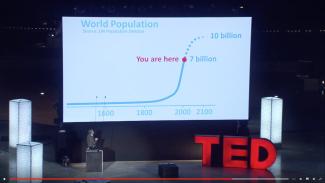Distorted perception
Middle-income majority

Rosling’s views are spelled out in the book “Factfulness”. It was published shortly after his death of cancer this year. Rosling wanted to make the general public aware of important, under-appreciated trends. In Europe and North America, for example, most people think that there is a huge gap between a small group of advanced nations and a big group of developing countries. The truth, however, is that the vast majority of human beings live in middle-income countries.
That this is so, is reflected in other trends: humankind’s average life expectancy is 70 years today, and 80 % of the world’s one-year-olds have been vaccinated. On average, men who are 30 years old today have spent ten years in school. The average figure for women of the same age is nine years. This gap is much smaller than most people assume. Only 20 % of all human beings lack access to electric power. The world population is still growing, but the reason is that people live longer. The number of children is no longer increasing.
For good reason, Rosling argued that we should stop using the categories of “developing” and “developed” nations. In his perspective, the relevant distinction should be people’s income levels. In the book, statistics generally rely on four categories of people. At level 1, people have a purchasing power of up to $ 2 per day. That figure rises to $ 8 for people at level 2 and $ 32 for those at level 3. Those who have more than $ 32 belong to level 4. Of the world’s 7 billion people, only 1 billion are at level 1. Three billion are at Level 2, 2 billion are at level 3, and 1 billion are at level 4.
According to Rosling, the conventional categories of developed versus developing countries distorts people’s perceptions. It suggests that there is a big gap between the categories. In truth, however, the income levels overlap national borders. If you judge by the average income, India belongs to the upper end of level 2. Averages hide relevant information however, and India indeed has a substantial number of prosperous level 4 people. On the other hand, it has a huge number of people who are still stuck in the desperate poverty of level 1. In a similar sense, poor people in the rich world do not have the purchasing power of $ 32 per day which would lift them up to level 4. Some poor people in the EU must cope with less than $ 16 per day and belong to level 2.
Rosling cooperated closely with his son Ola Rosling and his daughter-in-law Anna Rosling Rönnlund. They are the co-authors of Factfulness. In many ways, the arguments made in the book resemble those made by Harvard scholar Steven Pinker (see D+C/E+Z e-Paper 2018/07, p. 16). The Roslings’ book is easier to read – and more fun. Where Pinker extensively and appropriately refers to tomes of literature, Hans Rosling tells of his personal experiences. His enthusiasm is as charming as his long professional career in global development affairs was impressive. Among other things, he worked as a medical doctor in sub-Saharan Africa.
While the Rosling family shows that many trends are better than generally assumed, they do not encourage complacency. Climate change, for example, is a serious challenge that humankind must rise to. They emphasise, however, that action must be guided by solid data.
The book uses largely self-explaining terms such as the “negativity instinct”, the “straight-line instinct” or the “fear instinct” to point out why people’s perceptions are distorted. The authors want readers to do their best to educate themselves in a “factful” manner. The book’s strongest point is that it serves this purpose in a very entertaining way.
Reference
Rosling, H., with Rosling, O., and Rosling Rönnlund, A., 2018: Factfulness – Ten reasons we’re wrong about the world and why things are better than you think. London: Sceptre.
German edition, 2018: Factfulness – Wie wir lernen, die Welt so zu sehen, wie sie wirklich ist”. Berlin: Ullstein.















